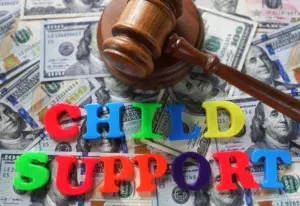
One of the most stressful aspects of any disagreement between parents, whether they are divorcing, separating, or were never married in the first place, is sorting out a child custody schedule and a parenting plan. When you add child support to the mix, things can get even worse.
It’s important to know what to expect at a child support hearing. An improper decision can financially cripple your future or your ex-spouse’s. And a parent that feels taken advantage of financially can take their frustration out on their kids, hurting the relationship.
It’s essential to note that every state follows different guidelines in child support calculation. However, they all have one key goal: a fair child support arrangement. In this article, we’ll discuss the most important questions you may encounter during a child support hearing to help you prepare for child support court.
Table of Contents
What Kind of Questions Does a Judge During a Child Support Hearing?
During a child custody battle, the family court judge will ask both parents to answer several questions to determine what will work best for the kid or kids involved. The court’s primary concern is your child and what is best for them.
Here are common questions to expect:
- The child’s needs. Questions related to a kid’s needs are a must, and you must give accurate and honest answers to the court. The parents should prepare for the child support hearing with verifiable and exact answers to the following questions:
- How old are your kid/kids?
- How much money do you spend on your child’s food, clothing, and education?
- How much do you spend on child care (if applicable)?
- How much do you normally spend on doctor’s visits?
- Does your kid have any special needs? If so, what are those needs, and how do they affect your expenses.
- Assets and income. The family court judge will also ask both parents questions about their income and assets. The money for child support payments will come from those sources of income, so don’t lie or give false information because it will work against you. Giving false information to the judge and lying will hurt your credibility during future child support hearings, and you may face severe penalties. It’s imperative to note that the amount of child support is calculated based on you and your ex-spouse’s potential earning, not on the actual income. Thus, the judge may establish that a parent is voluntarily working at a low-income job when the same job is available for a substantially higher income. Here, the family law court will consider hardships because the child support amount is voluntary. There are exceptions, and a skilled family law lawyer can argue that the higher-income job poses health risks to the non-custodial parent and will hinder their ability to pay child support in the future.
- Parents’ expenses. Further, the judge will also ask about you and your ex-spouse’s expenses and will expect verifiable information. During a child support hearing, you may have to answer questions about more serious payments, such as extra responsibilities, medical emergencies, and the cost of caring for your other children from another marriage. Based on the responses you give and your state’s child support guidelines, the family law judge will develop an equitable and suitable solution for the kids and their parents.
- Communication. Most family court judges prefer to grant child custody for both parents because they consider the child should spend equal time with their parents. To achieve that, the judge will inquire about the level of communication between both parents. It’s crucial to communicate with your ex-partner about decisions that affect your child’s daily life, especially in a joint child custody arrangement. The family law court will ensure that both parents play an active role in raising and caring for their kids.
- Existing child custody arrangements. The judge won’t interfere with an existing child custody arrangement, especially if everything is working just fine. Thus, a judge may ask you about your current informal or formal child custody arrangements. Make sure you provide relevant information and be sure to explain clearly what aspects of the arrangement aren’t working (if any). If you have made no child custody arrangements previously, the family law judge will ask you questions regarding the type of arrangement you seek. Typically, the family law court prefers granting joint custody arrangements because it benefits both parents and is the best for their kids. Unlike sole custody, joint child custody allows a child to build a close relationship with both parents. Our Colorado Springs child custody attorneys can help ensure you get the right arrangement.
Can I Use Child Support To Settle Personal Matters?
It’s essential to note that child support is for your child’s benefit only. Thus, neither you and your ex-spouse should use it for personal matters. If your ex-wife or husband tries to benefit from child support, report such conduct to the court as soon as possible.
Such violations may lead to legal complications, such as loss of custody rights or visitation depending on the state you live in. Similarly, the court may order recalculation of the child support amount to establish the exact amount that your child requires.
Typically, child support issues are complex and require legal guidance from an experienced child support lawyer. Child support cases require a ton of interaction between parents and the court. Thus, it’s in your best interests to seek legal representation from an experienced attorney. A child support lawyer will help you handle child support hearing questions effectively, gather all the necessary evidence, and represent you in court hearings.
Can I Request a Modification of Child Support Order?
A child support modification can be upward, for instance, if the custodial parent asks for more money or downward–if the noncustodial parent wants the child support payment reduced. To get a child support modification, a parent must prove that there has been a change of circumstances so significant and continuing as to make the current terms of the child support order unfair. Also, a modification can be warranted where the child support order lacks a provision concerning medical support, such as unreimbursed medical expenses, insurance coverage, or payment for medical insurance copayments and deductibles.
The child support law in Colorado provides that a substantial and continuing change of circumstances doesn’t need to exist if the new circumstances would only cause less than a 10% change in child support under the guidelines.
Often, modifications may be granted when a non-custodial parent suffers a major loss of income or loses a job involuntarily, or when the visitation and custodial arrangements change and the kids now spend more time with one parent and less with the other. These are just two scenarios. It will be up to the family court judge to determine if a parent’s new circumstances warrant a child support modification.
Get Help From Our Experienced Colorado Springs Child Support Lawyers!
If you’re seeking child support or would like to make sure that the amount you’re required to pay is fair under the statute, call a skilled child support attorney as soon as you can. At Brighter Day℠ Law, our skilled family law attorneys are dedicated to protecting the rights of spouses involved in child support disputes and we work hard to bring every child support case to a successful resolution. For an initial consultation with one of our knowledgeable Colorado Springs child support attorneys, contact our family law firm today at 719-733-9129.


